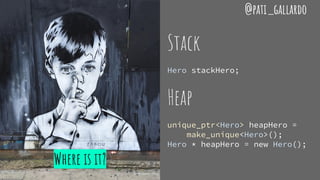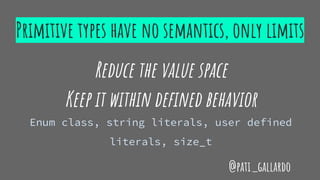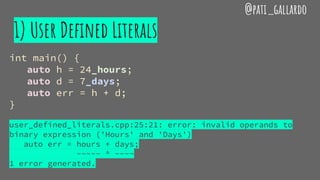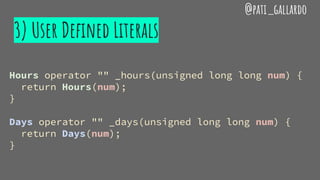Secure Programming Practices in C++ (NDC Oslo 2018)
- 2. Secure Programming Practices in C++ @pati_gallardo Patricia Aas NDC { Oslo } 2018
- 3. Patricia Aas - Vivaldi Browser Programmer - mainly in C++ Currently : Vivaldi Technologies Previously : Cisco Systems, Knowit, Opera Software Master in Computer Science Twitter : @pati_gallardo Photos: pixabay.com - CC0
- 4. Bjarne Stroustrup “C makes it easy to shoot yourself in the foot; C++ makes it harder, but when you do it blows your whole leg off.” @pati_gallardo
- 5. Bjarne Stroustrup “Within C++, there is a much smaller and cleaner language struggling to get out.” @pati_gallardo
- 6. What specs exist? Undefined Behavior Compiler Optimizations Exploitability Take your vitamins The Eight I'd Really Rather You Didn'ts @pati_gallardo
- 8. CG: C++ Core Guidelines (328 pages!) @pati_gallardo
- 9. C++ Core Guidelines “The C++ Core Guidelines are a collaborative effort led by Bjarne Stroustrup, much like the C++ language itself.” https://github.com/isocpp/CppCoreGuidelines/blob/master/README.md @pati_gallardo
- 10. @pati_gallardo SEI: CERT C++ Coding Standard (435 pages!)
- 11. SEI CERT C Coding Standard “The SEI CERT C [and C++] Coding Standard is a software coding standard for the C [and C++] programming language, developed by the CERT Coordination Center to improve the safety, reliability, and security of software systems.” https://en.wikipedia.org/wiki/CERT_C_Coding_Standard @pati_gallardo
- 12. CWE : Common Weakness Enumeration (1572 pages!) @pati_gallardo
- 13. Common Weakness Enumeration (CWE) “The Common Weakness Enumeration (CWE) is a category system for software weaknesses and vulnerabilities. It is sustained by a community project with the goals of understanding flaws in software and creating automated tools that can be used to identify, fix, and prevent those flaws.” https://en.wikipedia.org/wiki/Common_Weakness_Enumeration @pati_gallardo
- 14. What specs exist? Undefined Behavior Compiler Optimizations Exploitability Take your vitamins The Eight I'd Really Rather You Didn'ts @pati_gallardo
- 16. undefined behavior “Examples of undefined behavior are memory accesses outside of array bounds, signed integer overflow, null pointer dereference, modification of the same scalar more than once in an expression without sequence points, access to an object through a pointer of a different type, etc. Compilers are not required to diagnose undefined behavior (although many simple situations are diagnosed), and the compiled program is not required to do anything meaningful.” http://en.cppreference.com/w/cpp/language/ub @pati_gallardo
- 17. - Don’t reason about undefined behaviour - Assume that it crashes or is never executed - Changing compiler, compiler version or optimization level can break your application Undefined Behaviour
- 18. Infinite Loop (Undefined Behavior) #include <iostream> #include <complex> using namespace std; int main(void) { complex<int> delta; complex<int> mc[4] = {0}; for(int di = 0; di < 4; di++, delta = mc[di]) { cout << di << endl; } } @pati_gallardo (Thanks to @shafikyaghmour) https://stackoverflow.com/questions/32506643/c-compilation-bug Undefined Behavior!
- 19. Infinite Loop (Undefined Behavior) Should we Godbolt this? https://godbolt.org/g/TDjM8h @pati_gallardo (Thanks to @shafikyaghmour) https://stackoverflow.com/questions/32506643/c-compilation-bug
- 20. What specs exist? Undefined Behavior Compiler Optimizations Exploitability Take your vitamins The Eight I'd Really Rather You Didn'ts @pati_gallardo
- 22. @pati_gallardo The Case Of The Disappearing Memset
- 23. 0) CWE-14: Compiler Removal of Code to Clear Buffers void GetData(char *MFAddr) { char pwd[64]; if (GetPasswordFromUser(pwd, sizeof(pwd))) { if (ConnectToMainframe(MFAddr, pwd)) { // Interaction with mainframe } } memset(pwd, 0, sizeof(pwd)); // <- Removed by the optimizer } @pati_gallardo SEI: MSC06-C. Beware of compiler optimizations SEI: MEM03-C. Clear sensitive information stored in reusable resources
- 24. 0) CWE-14: Compiler Removal of Code to Clear Buffers Should we Godbolt this? https://godbolt.org/g/FpEsht @pati_gallardo SEI: MSC06-C. Beware of compiler optimizations SEI: MEM03-C. Clear sensitive information stored in reusable resources
- 25. Memset_s : Zeroing Memory // Compliant Solution (C11) memset_s(pwd, 0, sizeof(pwd)); // Windows Solution SecureZeroMemory(pwd, sizeof(pwd)); @pati_gallardo SEI: MSC06-C. Beware of compiler optimizations SEI: MEM03-C. Clear sensitive information stored in reusable resources
- 26. What specs exist? Undefined Behavior Compiler Optimizations Exploitability Take your vitamins The Eight I'd Really Rather You Didn'ts @pati_gallardo
- 28. 1. Unsigned Integer Wraparound 2. Signed Integer Overflow 3. Numeric Truncation 4. Stack Buffer Overflow 5. Heap Buffer Overflow 6. Buffer Underflow 7. Use After Free 8. Double Free 9. Incorrect Type Conversion 10. Uncontrolled Format String @pati_gallardo
- 29. Code is on GitHub: https://github.com/patricia-gallardo/insecure-coding-examples Disclaimer: The concat buffer examples aren’t really fair because if you did concatenation of strings in this way you would have to take into consideration 0 termination of strings and that doesn’t fit on a slide, so... sigh @pati_gallardo
- 30. 1) Unsigned Integer Wraparound 2) Signed Integer Overflow 3) Numeric Truncation Error
- 31. 1) CWE-190: Unsigned Integer Wraparound int main(void) { unsigned int first_len = UINT_MAX; unsigned int second_len = 256; unsigned int buf_len = 256; char first[first_len], second[second_len], buf[buf_len]; if((first_len + second_len) <= 256) { // <- sum == 255 memcpy(buf, first, first_len); memcpy(buf + first_len, second, second_len); } } @pati_gallardo SEI-INT30-C. Ensure that unsigned integer operations do not wrap
- 32. 2) CWE-190: Signed Integer Overflow int main(void) { int first_len = INT_MAX; int second_len = 256; int buf_len = 256; char first[first_len], second[second_len], buf[buf_len]; if((first_len + second_len) <= 256) { // <- UB (negative) memcpy(buf, first, first_len); memcpy(buf + first_len, second, second_len); } } @pati_gallardo SEI-INT32-C. Ensure that operations on signed integers do not result in
- 33. 3) CWE-197: Numeric Truncation Error int main(void) { unsigned int first_len = UINT_MAX - 256; unsigned int second_len = 256; unsigned int buf_len = 256; char first[first_len], second[second_len], buf[buf_len]; int new_len = (first_len+second_len); // <- IDB (negative) if(new_len <= 256) { memcpy(buf, first, first_len); memcpy(buf + first_len, second, second_len); } } @pati_gallardo SEI-INT31-C. Ensure that integer conversions do not result in lost or misinterpreted data
- 34. 4) Stack-based Buffer Overflow 5) Heap-based Buffer Overflow 6) Buffer Underwrite/Underflow
- 35. 4) CWE-121: Stack-based Buffer Overflow @pati_gallardo int main(void) { char buffer[10]; // CWE-242 : Inherently Dangerous Function gets(buffer); // <- Write outside } SEI-STR31-C. Guarantee that storage for strings has sufficient space for character data and the null terminator
- 36. 5) CWE-122: Heap-based Buffer Overflow int main(int argc, char * argv[]) { char* buf = (char*) malloc(sizeof(char)*10); strcpy(buf, argv[1]); // <- Write outside free(buf); } @pati_gallardo SEI-ARR38-C. Guarantee that library functions do not form invalid pointers
- 37. 6) CWE-124: Buffer Underwrite / Underflow int main(void) { char src[12]; strcpy(src, "Hello World"); size_t length = strlen(src); int index = (length -1); while (src[index] != ':') { src[index] = '0'; index--; } } @pati_gallardo SEI-ARR30-C. Do not form or use out-of-bounds pointers or array subscripts
- 38. 7) Use After Free 8) Double Free
- 39. 7) CWE-416: Use After Free @pati_gallardo int main(void) { char* buffer = (char*)malloc (256); bool error = true; if (error) free(buffer); // [...] if (error) printf("%lun", strlen(buffer)); //<- Use after free } SEI-MEM30-C. Do not access freed memory
- 40. 8) CWE-415: Double Free @pati_gallardo int main(void) { char* buffer = (char*)malloc (256); bool error = true; if (error) free(buffer); // [...] free(buffer); // second free } SEI-MEM51-CPP. Properly deallocate dynamically allocated resources
- 41. 9) Incorrect Type Conversion/Cast 10) Use of External Format String
- 42. 9) CWE-704: Incorrect Type Conversion/Cast @pati_gallardo struct A {}; struct B {}; int main(void) { struct A * a = (struct A *) malloc (sizeof (struct A)); struct B * b = (struct B *) a; // cast to unrelated type } SEI-EXP05-CPP. Do not use C-style casts
- 43. 10) CWE-134: Use of External Format String @pati_gallardo int main(int argc, char * argv[]) { char * format = argv[1]; char * str = argv[2]; printf(format, str); } $ ./format_string "%s %d" "Hello World" Hello World 1745066888 SEI-FIO47-C. Use valid format strings
- 44. What specs exist? Undefined Behavior Compiler Optimizations Exploitability Take your vitamins The Eight I'd Really Rather You Didn'ts @pati_gallardo
- 46. Classes of Tools - Several compilers - Warnings / Errors - Instrumentation - Static Analysis - Automated Tests - Fuzzing - Continuous Integration - Libraries @pati_gallardo
- 47. What specs exist? Undefined Behavior Compiler Optimizations Exploitability Take your vitamins The Eight I'd Really Rather You Didn'ts @pati_gallardo
- 48. The Eight I'd Really Rather You Didn'ts* *The Eight Condiments (Pastafarianism) @pati_gallardo
- 49. Caution: Don’t take me too seriously. But seriously, think about it! *wink* @pati_gallardo
- 50. The Eight I'd Really Rather You Didn'ts 1. Use C 2. Allocate with new 3. Do math a lot 4. Trust your external input 5. Use pointers a lot 6. Write “clever” code 7. Use shared_ptr a lot 8. Use share state a lot @pati_gallardo
- 51. 1. I'd Really Rather You Didn't: Use C @pati_gallardo CG : CPL.1: Prefer C++ to C
- 52. Std::string - Concatenate Strings int main() { std::string first = "Hello "; std::string second = "World"; std::string buffer = first + second; std::cout << buffer << "n"; } @pati_gallardo
- 53. Std::cout/cin : Using the Command Line int main(int argc, char * argv[]) { std::string second; std::cin >> second; std::string first = argv[1]; std::string buffer = first + second; std::cout << buffer << "n"; } $ ./command_line "Hello " World Hello World @pati_gallardo
- 54. Algorithms : Strip after Colon int main() { string str = "Hello:World"; auto isColon = [](int ch) { return ch == ':'; }; auto first = find_if(rbegin(str), rend(str), isColon); str.erase(first.base(), end(str)); } @pati_gallardo
- 55. C++ Casts : Safe Downcasting class Spiderman {}; class Ironman {}; int main() { Spiderman * peter = new Spiderman; Ironman * tony = static_cast<Ironman*>(peter); } inheritance.cpp:6:20: error: static_cast from 'Spiderman *' to 'Ironman *', which are not related by inheritance, is not allowed Ironman * tony = static_cast<Ironman*>(peter); ^~~~~~~~~~~~~~~~~~~~~~~~~~~~ 1 error generated. @pati_gallardo
- 56. @pati_gallardo CG : R: Resource management CG : R.11: Avoid calling new and delete explicitly 2. I'd Really Rather You Didn't: Allocate With New
- 57. Allocating on the Stack #include "Hero.h" int main() { Hero h; } @pati_gallardo
- 58. Where is it? Stack Hero stackHero; Heap unique_ptr<Hero> heapHero = make_unique<Hero>(); Hero * heapHero = new Hero(); @pati_gallardo
- 59. Loving the Stack #include <iostream> #include <string> using namespace std; int main() { { string s("Hello World!"); cout << s; } // <- GC happens here! } @pati_gallardo
- 60. Using the Stack To Manage Resource Lifetimes Destroyed when exiting scope Deterministic Garbage Collection @pati_gallardo
- 61. Hold a Value on the Stack that Controls The Lifetime of Your Heap Allocated Object using namespace std; { unique_ptr<Hero> myHero = make_unique<Hero>(); shared_ptr<Hero> ourHero = make_shared<Hero>(); } Smart Pointers @pati_gallardo
- 62. @pati_gallardo 3. I'd Really Rather You Didn't: Do Math A Lot
- 63. Primitive types have no semantics, only limits Reduce the value space Keep it within defined behavior Enum class, string literals, user defined literals, size_t @pati_gallardo
- 64. Enum Class @pati_gallardo enum class Direction : char { NORTH = 'N', EAST = 'E', WEST = 'W', SOUTH = 'S' }; std::ostream& operator << (std::ostream& os, const Direction& obj) { os << static_cast<std::underlying_type<Direction>::type>(obj); return os; } int main() { std::cout << "t" << Direction::NORTH << "n" << "t" << Direction::EAST << "n" << "t" << Direction::WEST << "n" << "t" << Direction::SOUTH << "n"; }
- 65. String Literals @pati_gallardo using namespace std::literals::string_literals; int main() { auto heroes = {"Spiderman"s, "Ironman"s, "Wonder Woman"s}; for(auto const & hero : heroes) { std::cout << "t" << hero << "n"; } }
- 66. 1) User Defined Literals @pati_gallardo int main() { auto h = 24_hours; auto d = 7_days; auto err = h + d; } user_defined_literals.cpp:25:21: error: invalid operands to binary expression ('Hours' and 'Days') auto err = hours + days; ~~~~~ ^ ~~~~ 1 error generated.
- 67. 2) User Defined Literals @pati_gallardo struct Hours { explicit Hours(unsigned long long n) : num(n) {} unsigned long long num = 0; }; struct Days { explicit Days(unsigned long long n) : num(n) {} unsigned long long num = 0; };
- 68. 3) User Defined Literals @pati_gallardo Hours operator "" _hours(unsigned long long num) { return Hours(num); } Days operator "" _days(unsigned long long num) { return Days(num); }
- 69. Use Size_t for Sizes - Unsigned integer type - Result of the sizeof operator - Use for object sizes - Use for array indexing and loop counting @pati_gallardo
- 70. @pati_gallardo 4. I'd Really Rather You Didn't: Trust Your External Input
- 71. Taint - Is the source of this value in your code? - Command line args, size fields in headers, exported functions, APIs @pati_gallardo
- 72. 5. I'd Really Rather You Didn't: Use Pointers a Lot @pati_gallardo
- 73. @pati_gallardo 6. I'd Really Rather You Didn't: Write “clever” code
- 74. 7. I'd Really Rather You Didn't: Use shared_ptr a Lot @pati_gallardo
- 75. 8. I'd Really Rather You Didn't: Share State a Lot @pati_gallardo
- 76. So… what should I remember from this presentation? @pati_gallardo
- 77. Well, I'd Really Rather You Didn't: Use C @pati_gallardo
- 78. Learn some Modern C++ Instead! @pati_gallardo
- 79. @pati_gallardo











![SEI CERT C Coding Standard
“The SEI CERT C [and C++] Coding Standard is a software coding
standard for the C [and C++] programming language, developed
by the CERT Coordination Center to improve the safety,
reliability, and security of software systems.”
https://en.wikipedia.org/wiki/CERT_C_Coding_Standard
@pati_gallardo](https://image.slidesharecdn.com/secureprogrammingndcoslo2018-180614142321/85/Secure-Programming-Practices-in-C-NDC-Oslo-2018-11-320.jpg)

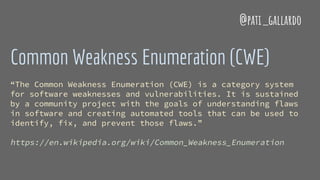



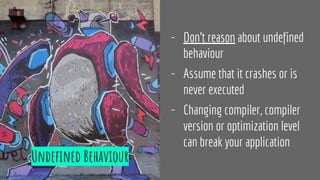
![Infinite Loop (Undefined Behavior)
#include <iostream>
#include <complex>
using namespace std;
int main(void) {
complex<int> delta;
complex<int> mc[4] = {0};
for(int di = 0; di < 4; di++, delta = mc[di]) {
cout << di << endl;
}
}
@pati_gallardo
(Thanks to @shafikyaghmour) https://stackoverflow.com/questions/32506643/c-compilation-bug
Undefined
Behavior!](https://image.slidesharecdn.com/secureprogrammingndcoslo2018-180614142321/85/Secure-Programming-Practices-in-C-NDC-Oslo-2018-18-320.jpg)




![0) CWE-14: Compiler Removal of Code to Clear Buffers
void GetData(char *MFAddr) {
char pwd[64];
if (GetPasswordFromUser(pwd, sizeof(pwd))) {
if (ConnectToMainframe(MFAddr, pwd)) {
// Interaction with mainframe
}
}
memset(pwd, 0, sizeof(pwd)); // <- Removed by the optimizer
}
@pati_gallardo
SEI: MSC06-C. Beware of compiler optimizations
SEI: MEM03-C. Clear sensitive information stored in reusable resources](https://image.slidesharecdn.com/secureprogrammingndcoslo2018-180614142321/85/Secure-Programming-Practices-in-C-NDC-Oslo-2018-23-320.jpg)






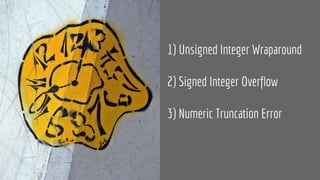
![1) CWE-190: Unsigned Integer Wraparound
int main(void) {
unsigned int first_len = UINT_MAX;
unsigned int second_len = 256;
unsigned int buf_len = 256;
char first[first_len], second[second_len], buf[buf_len];
if((first_len + second_len) <= 256) { // <- sum == 255
memcpy(buf, first, first_len);
memcpy(buf + first_len, second, second_len);
}
}
@pati_gallardo
SEI-INT30-C. Ensure that unsigned integer operations do not wrap](https://image.slidesharecdn.com/secureprogrammingndcoslo2018-180614142321/85/Secure-Programming-Practices-in-C-NDC-Oslo-2018-31-320.jpg)
![2) CWE-190: Signed Integer Overflow
int main(void) {
int first_len = INT_MAX;
int second_len = 256;
int buf_len = 256;
char first[first_len], second[second_len], buf[buf_len];
if((first_len + second_len) <= 256) { // <- UB (negative)
memcpy(buf, first, first_len);
memcpy(buf + first_len, second, second_len);
}
}
@pati_gallardo
SEI-INT32-C. Ensure that operations on signed integers do not result in](https://image.slidesharecdn.com/secureprogrammingndcoslo2018-180614142321/85/Secure-Programming-Practices-in-C-NDC-Oslo-2018-32-320.jpg)
![3) CWE-197: Numeric Truncation Error
int main(void) {
unsigned int first_len = UINT_MAX - 256;
unsigned int second_len = 256;
unsigned int buf_len = 256;
char first[first_len], second[second_len], buf[buf_len];
int new_len = (first_len+second_len); // <- IDB (negative)
if(new_len <= 256) {
memcpy(buf, first, first_len);
memcpy(buf + first_len, second, second_len);
}
}
@pati_gallardo
SEI-INT31-C. Ensure that integer conversions do not result in lost or misinterpreted data](https://image.slidesharecdn.com/secureprogrammingndcoslo2018-180614142321/85/Secure-Programming-Practices-in-C-NDC-Oslo-2018-33-320.jpg)
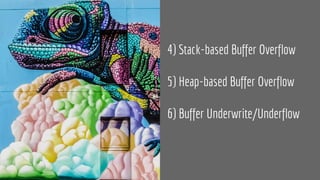
![4) CWE-121: Stack-based Buffer Overflow
@pati_gallardo
int main(void) {
char buffer[10];
// CWE-242 : Inherently Dangerous Function
gets(buffer); // <- Write outside
}
SEI-STR31-C. Guarantee that storage for strings has sufficient space for character data and the null terminator](https://image.slidesharecdn.com/secureprogrammingndcoslo2018-180614142321/85/Secure-Programming-Practices-in-C-NDC-Oslo-2018-35-320.jpg)
![5) CWE-122: Heap-based Buffer Overflow
int main(int argc, char * argv[]) {
char* buf = (char*) malloc(sizeof(char)*10);
strcpy(buf, argv[1]); // <- Write outside
free(buf);
}
@pati_gallardo
SEI-ARR38-C. Guarantee that library functions do not form invalid pointers](https://image.slidesharecdn.com/secureprogrammingndcoslo2018-180614142321/85/Secure-Programming-Practices-in-C-NDC-Oslo-2018-36-320.jpg)
![6) CWE-124: Buffer Underwrite / Underflow
int main(void) {
char src[12];
strcpy(src, "Hello World");
size_t length = strlen(src);
int index = (length -1);
while (src[index] != ':') {
src[index] = '0';
index--;
}
}
@pati_gallardo
SEI-ARR30-C. Do not form or use out-of-bounds pointers or array subscripts](https://image.slidesharecdn.com/secureprogrammingndcoslo2018-180614142321/85/Secure-Programming-Practices-in-C-NDC-Oslo-2018-37-320.jpg)

![7) CWE-416: Use After Free
@pati_gallardo
int main(void) {
char* buffer = (char*)malloc (256);
bool error = true;
if (error)
free(buffer);
// [...]
if (error)
printf("%lun", strlen(buffer)); //<- Use after free
}
SEI-MEM30-C. Do not access freed memory](https://image.slidesharecdn.com/secureprogrammingndcoslo2018-180614142321/85/Secure-Programming-Practices-in-C-NDC-Oslo-2018-39-320.jpg)
![8) CWE-415: Double Free
@pati_gallardo
int main(void) {
char* buffer = (char*)malloc (256);
bool error = true;
if (error)
free(buffer);
// [...]
free(buffer); // second free
}
SEI-MEM51-CPP. Properly deallocate dynamically allocated resources](https://image.slidesharecdn.com/secureprogrammingndcoslo2018-180614142321/85/Secure-Programming-Practices-in-C-NDC-Oslo-2018-40-320.jpg)


![10) CWE-134: Use of External Format String
@pati_gallardo
int main(int argc, char * argv[]) {
char * format = argv[1];
char * str = argv[2];
printf(format, str);
}
$ ./format_string "%s %d" "Hello World"
Hello World 1745066888
SEI-FIO47-C. Use valid format strings](https://image.slidesharecdn.com/secureprogrammingndcoslo2018-180614142321/85/Secure-Programming-Practices-in-C-NDC-Oslo-2018-43-320.jpg)


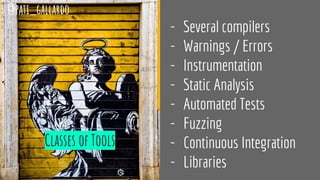






![Std::cout/cin : Using the Command Line
int main(int argc, char * argv[]) {
std::string second;
std::cin >> second;
std::string first = argv[1];
std::string buffer = first + second;
std::cout << buffer << "n";
}
$ ./command_line "Hello "
World
Hello World
@pati_gallardo](https://image.slidesharecdn.com/secureprogrammingndcoslo2018-180614142321/85/Secure-Programming-Practices-in-C-NDC-Oslo-2018-53-320.jpg)
 { return ch == ':'; };
auto first = find_if(rbegin(str), rend(str), isColon);
str.erase(first.base(), end(str));
}
@pati_gallardo](https://image.slidesharecdn.com/secureprogrammingndcoslo2018-180614142321/85/Secure-Programming-Practices-in-C-NDC-Oslo-2018-54-320.jpg)



